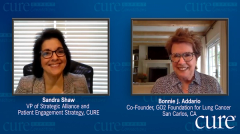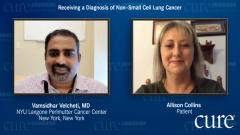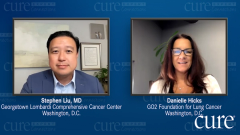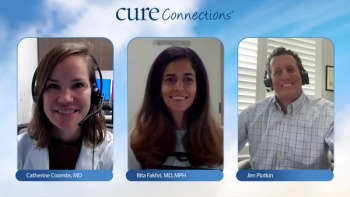
NSCLC: Future Directions in Care and Take-Home Messages
Shared insight on novel treatments for non-small cell lung cancer and how patients should advocate for themselves and seek best available care.
Episodes in this series

Vamsidhar Velcheti, M.D.: You could certainly consider rechallenging with immunotherapy if there’s a need. Hopefully, we don’t have to worry about that. I think the other exciting thing is now, you mentioned you have the KRAS G12C mutation. So now in addition to going back to the immunotherapy, you also have an additional really good treatment option as well. I think that’s the beauty of science. The more time we can actually keep things controlled, hopefully we would have cured it. I’m hoping everything’s going to be stable, and you don’t have to worry about the cancer coming back. If it does indeed come back, then we have a lot of newer treatment options, some of which are FDA approved, like the KRAS G12C, which was FDA approved recently with sotorasib. There are a lot of different treatments as well. Even newer versions of immunotherapy treatments, which are in clinical trials right now, could be an option down the road. So I think as our understanding of lung cancer and the biology of lung cancer increases, there are more and more treatment options. The hope is that we never need any of these treatments, but I think it’s reassuring to hear that. Did [Neal] Ready, [M.D., Ph.D.,] talk to you about the KRAS mutation in your tumor? Did he mention to you about the treatment options?
Allison Collins: We haven’t really discussed it. I brought it up when the pill, sotorasib, was coming out. I was like, “Have you heard the good news? Now there’s a….” He was like, “Yes. But we’re not going to go down that road yet. Not unless something comes up.” I am just so excited. Initially when I went in, and like I said, not knowing anything when I got diagnosed, there were other people who had the EGFR mutation, and at that time, he had told me there was no type of pill for me. I was discouraged.
Vamsidhar Velcheti, M.D.: Back in 2018, certainly he was right. These drugs were not even in clinical trials back then. This is a relatively newer thing, we are developing newer treatments for these KRAS mutations. Now most recently, it’s already FDA approved. So it’s always good to have these multiple treatment options. I agree given that everything’s stable, you’ve been off treatment, and you’re just watching with CT scans, I don’t think you should start any treatment right now. It’s always good to know that there are multiple treatment options available to you when the cancer starts acting up. In terms of treatment options, of course you’ve had immunotherapy, and the standard option back then [in] 2018 was chemotherapy, and you haven’t even had chemotherapy yet, which is still an option. So you have multiple new treatment options available should you need them, and hopefully you won’t need them.
Allison Collins: Myself, I think I discussed this with you before; the area where I live is rural. Health care, particularly in cancer care, is kind of substandard. I feel like sometimes you need to go outside of your comfort zone to a bigger research hospital where you can have biomarker testing done. Where I live, I’ve talked to a few other people around here who were diagnosed with non-small cell lung cancer, adenocarcinoma, like myself. They were misdiagnosed here in our area. So I think that it’s important to go somewhere where you can get biomarker testing done.
Vamsidhar Velcheti, M.D.: I think you highlight a very good point. It is really important, especially for something as complex as cancer, to make sure you get all the work-up and all the testing that you need and come up with the right treatment plan. You don’t necessarily have to always go and get treated at a large cancer center, but at least making sure that you’re on the right path, and getting a second opinion, perhaps. Getting a treatment recommendation from a larger cancer center definitely would make sense. Sometimes there might be treatments that could be applicable for your type of cancer that may be available in clinical trials that may not necessarily be available in smaller hospitals.
I think the take-home message here is that you’ve beaten all the odds already. Being on immunotherapy back in 2018 with dual immunotherapy, you’ve done exceedingly well. I think that speaks to the power of clinical trials and having access to cutting-edge treatments for lung cancer. There’s a lot of hope, and there are a lot of new treatments out there. It’s really encouraging in terms of our advances in terms of treatments for lung cancer.
Thank you so much, Allison. I really appreciate your time and spending this time with our program, and hopefully the audience enjoyed the discussion.
Allison Collins: Thank you.
Transcript edited for clarity.



